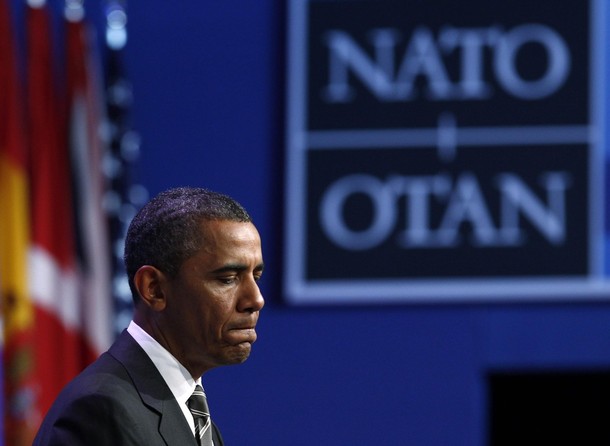
From Luiza Ch. Savage, Macleans: It has been almost a year since former U.S. defense secretary Robert Gates, who served both Bush and Obama, focused his final speech on blasting NATO allies who are “apparently unwilling to devote the necessary resources to be serious and capable partners in their own defence. . . .”
At a U.S. Senate hearing prior to Chicago, Tennessee Republican Sen. Bob Corker asked what the Obama administration could do to “cause this to be a true alliance—not one of us, again, providing security services, and [NATO allies] being the consumers.” The Obama administration points to Libya, which they consider a lesson to Europe in the dangers of under-resourcing NATO. When Washington joined the mission at least ostensibly aimed at protecting Libyan civilians from a massacre, the war-weary Americans entered with a caveat: they would perform in a support role, while allies like France and Britain would take the lead. But even though a Canadian commanded the mission, and Europeans flew the bombing missions aimed at Libyan forces, the exercise revealed major weaknesses in the alliance. The allies ran out of bombs—the kind of precision-guided munitions necessary when it’s important to hit tanks, not the school next to them. And they had to depend on the U.S. for most in-air refuelling and reconnaissance for target selection; the Americans also fired their own specialized missiles aimed at suppressing Libyan air defences both from unmanned drones and fixed-wing piloted aircraft. Such awkward details have led some critics to dismiss NATO’s supposedly leading role in the effort, and the United States’s posture of mere support, as misleading advertising.
“While every alliance member voted for the Libya mission, less than half have participated at all, and fewer than a third have been willing to participate in the strike mission,” Gates noted in last June’s fiery speech. “Frankly, many of those allies sitting on the sidelines do so not because they do not want to participate, but simply because they can’t. The military capabilities simply aren’t there.” A survey of 60 officials in Europe and the U.S. done in advance of the Chicago summit by the Atlantic Council, a Washington-based think tank, found the same thing: an overwhelming majority believed the mission could not have taken place without the U.S., and most predicted the alliance would not have the ability to carry it out alone.
And so, Philip Gordon, assistant secretary of state for European and Eurasian affairs, told the Senate hearing, the U.S. is “now able to say, ‘Well, there’s the example: if you don’t continue to invest in advanced fighter planes, precision-guided munitions and intelligence assets, then you won’t be able to do this in future, and you can’t expect the United States to do it for you.’ ”
And the worry in Washington is that Libya is just the beginning. With the Arab awakening, and increasing instability across the Middle East and North Africa, U.S. officials fear more and more such operations lie in NATO’s future.
But the allies’ response to Washington’s entreaties, lectures and threats has not been to provide more spending, but the precise opposite: to seek to do more with less—“security in an age of austerity,” as NATO Secretary General Anders Fogh Rasmussen put it in Chicago. Rasmussen pledged to reduce the number of NATO headquarters from 11 to seven, cut the number of posts by more than 30 per cent, and reduce the overall size of the Brussels headquarters. The allies also agreed to take part in an initiative called “smart defence,” aimed at increasing co-operation and coordination among member states, and to purchase more shared equipment for the alliance, including five of the Global Hawk drones used in Libya, and bomb-clearing robots. Smart defence’s crown jewel is a $1-billion European missile defence system. The co-operative effort would see the U.S. provide the bulk of the necessary technology; Turkey, a radar station; Spain and the Netherlands would hand over radar technology; Germany would contribute a base to serve as a command-and-control centre.
These new capabilities are expected to “allow NATO allies to diminish reliance on U.S. assets,” said a Canadian Department of National Defence official. But some observers say the moves are too modest. The Transatlantic Council’s NATO specialist Jorge Benitez predicts “greater friction and division within the alliance” when the next humanitarian crisis crops up on Europe’s doorstep. As in Libya, “the Europeans will be interested in crisis management,” says Benitez, but “the U.S. will say: ‘You want to buy things on the NATO credit card? We’re about to cut the credit card.’ ”
Even before the current financial problems, European allies had been cutting national security spending—by 20 per cent since the Cold War, in part because of a lack of public support, said Benitez. Those clamouring to get involved in missions to protect human rights and women’s rights, to prevent future Rwandas and Srebrenicas, are exactly the same people who “don’t want to fund institutions like NATO,” he says, adding he was “disappointed” by the summit, even by Rasmussen’s “smart defence” project. It’s “better than nothing,” he concedes, “but I have yet to be convinced smart defence will substantively resolve the defence capability gap between the U.S. and Europe,” he warned. (photo: Reuters)
Image: reuters%205%2030%2012%20Obama.jpg
